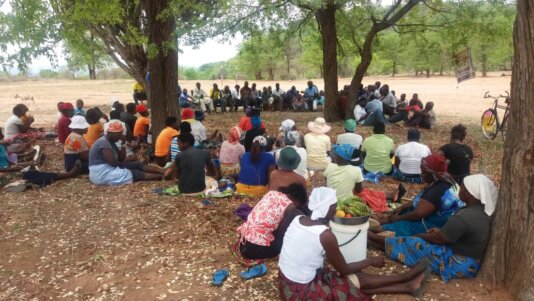- About
- Topics
- Picks
- Audio
- Story
- In-Depth
- Opinion
- News
- Donate
- Signup for our newsletterOur Editors' Best Picks.Send
Read, Debate: Engage.
| February 17, 2022 | |
|---|---|
| topic: | Human Rights |
| tags: | #Zimbabwe, #diamond mining, #Marange diamonds, #corruption |
| located: | Zimbabwe |
| by: | Andrew Mambondiyani |
Diamonds were discovered in Marange, eastern Zimbabwe, in 2006, but more than a decade after formal mining started, thousands of people in the vicinity of diamond fields are living miserably, as fields have become an outpost of human rights violations, according to various reports.
"Life is tough here at ARDA Transau," Donald Masvaure, who was forcibly relocated from Marange to a deserted government farm a few kilometres west of the eastern border city of Mutare, told FairPlanet.
In 2010, more than 1,000 families were relocated to Agricultural and Rural Development Authority (ARDA) Transau to make way for formal diamond mining. The diamond companies made various promises to the affected families, but these pledges were never fulfilled, leaving the villagers teetering on the brink of starvation every year. These families have no source of livelihoods.
Unfortunately, the diamond companies which relocated the families to ARDA Transau were forced to stop their mining operations in 2016 by Zimbabwe’s former president, Robert Mugabe. At that time, Mugabe alleged that the eight companies were involved in underhand diamond dealings.
The government took over all diamond mining in Marange through a state owned company, the Zimbabwe Consolidated Diamond Company (ZCDC). But in 2019, only Anjin Investments was allowed to resume mining operations in Marange under controversial circumstances.
"We were promised compensation and title deeds to our new houses by the diamond companies; all these promises never materialised. Many people are now abandoning their homes here at ARDA Transau," said Masvaure, who chairs the ARDA Transau Relocation Development Trust.
Some of the houses at ARDA Transau were poorly built and gapping cracks could be seen tearing through the bright yellow painted walls.
Tawanda Mufute, another resident at ARDA Transau, told FairPlanet that people at the settlement had no source of income; they cannot even afford to send their children to school.
"Some opting to sell their homes and relocate to other villages where there is enough land for farming. The land which we were given here is too small to sustain our families. Our biggest challenge is that we don’t have title deeds for the houses. We need that security [of tenure]," said Mufute, who serves as secretary of the ARDA Transau Relocation Development Trust.
Mufute said the companies currently operating in Marange - Zimbabwe Consolidated Diamond Company and Anjin Investments - should help them establish income generating projects at ARDA Transau.
"We were promised irrigation projects and these companies should fulfil that so that people are able to grow their own crops and sell the surplus to nearby city," he said.
Farai Maguwu, director of the Centre for Natural Resource Governance, said the situation remains dire at ARDA Transau; the government, he claims, has turned its back on the relocated people.
"Nothing much has changed. [There are] perennial water and food crises and many unfulfilled promises," Maguwu said.
Malvern Mudiwa, who resides outside the mining fields, told FairPlanet that for a long time communities have been patiently waiting for the Marange diamond issue to be addressed.
"We hoped the Zimunya Marange Community Share Ownership Trust (ZMCSOT) was going to be a game changer, but it proved to be a dream which never came true," said Mudiwa , who is the chairperson and founder of Marange Development Trust.
Mudiwa said that the lack of transparency and accountability became a source of suspicion within the community-shared ownership trust.
"ZMCSOT ceased to function due to lack of funding resulting in the administrator [of the trust] grabbing a motor vehicle, furniture and other equipments due to salary backlog. That was the sad history of the ZMCSOT," he said.
As such, Mudiwa said, the Marange residents regrouped and agreed to disband the trust and reorganised with extensive consultations from the village level all the way to the traditional chief, as well as from community-based organisations the area.
"We then come up a new arrangement altogether, the Marange Community Share Ownership Trust, which will be chaired by Chief Marange," Mudiwa said. "We are now waiting for our promised five percent from the Zimbabwe Consolidated Diamond Company as well as Anjin Investments. Above all, sooner rather than later we are expecting to be presented with the promised community diamond claim that we will be in partnership with ZCDC on a 30 /70 share with communities getting 30 [percent]."
And Mudiwa was bullish that the new arrangement, if it comes to fruition, would bring the much needed development to the Marange area.
"If this dream comes true, we are likely to see massive development in Marange. As we speak, a lot of ground work has been covered so far," he said.
However, Hans Merket, a researcher with International Peace Information Service (IPIS Research) told FairPlanet that while the main burden to address the challenges at Marange diamond fields falls on the Zimbabwe government and the companies involved, the international community also holds responsibility.
"This is particularly so as diamonds from Marange are sold across the globe, generally with no trace of their origin left by the time they reach consumers," Merket said.
Firstly, Merket said, those who continue to commit abuses in Marange, such as public or private security torturing entities that sometimes even kill locals, tend to do so with complete impunity.
"As long as there is no accountability - these atrocities will continue. The international governmental and business community should therefore use their leverage to push for holding perpetrators accountable. This goes particularly for the United Arab Emirates and the European Union, where most of these diamonds make their first stop on the way to the market, and India, where the bulk of Zimbabwean stones are cut and polished," he said.
He added that it must be guaranteed that Zimbabwe’s industrially mined diamonds benefit the local population; social, environmental and human rights standards need to be improved and independently audited at the mining level.
"The most promising standard in this regard has been developed by the Initiative for Responsible Mining Assurance (IRMA) that offers the only third-party, arms-length certification of industrial-scale mine sites. It is encouraging that the state-owned Zimbabwe Consolidated Diamond Company operating in Marange has expressed interest in complying with this standard and others should be stimulated to follow suit," he said.
Merket said Zimbabwe should be encouraged to decriminalise, facilitate and support artisanal mining in Marange.
"This long-ignored sector holds considerable unexploited development potential as it by far outweighs industrial mining in terms of employment generation, livelihood support and wealth spill-over to local economies," he said.
However, Maguwu said that his organisation, the Centre for Natural Resource Governance, was doing capacity building work targeting people affected by diamond mining.
"Our philosophy is to capacitate the community so they exercise their own agency. We also continue to raise these issues in civil society reports to the Kimberley Process as well as with visiting UN special rapporteurs. We also invite Marange residents to several forums where they articulate their challenges to a wider audience," Maguwu said.
Image by Sina Katirachi via Unsplash
By copying the embed code below, you agree to adhere to our republishing guidelines.

